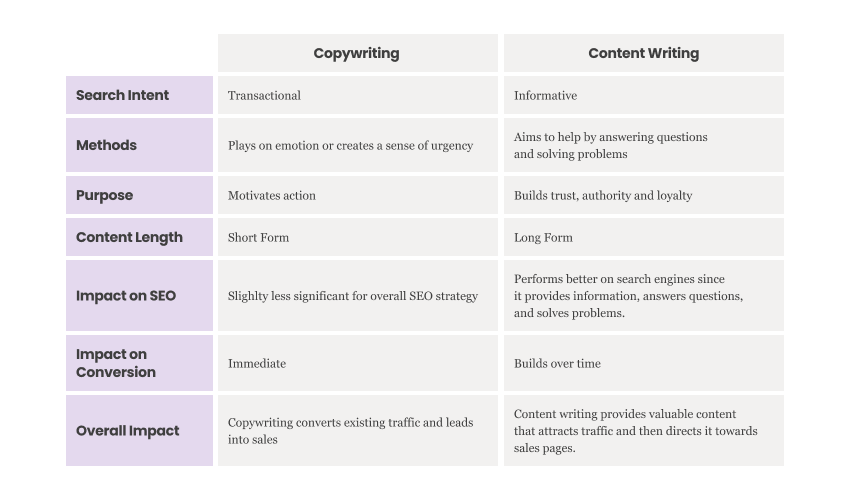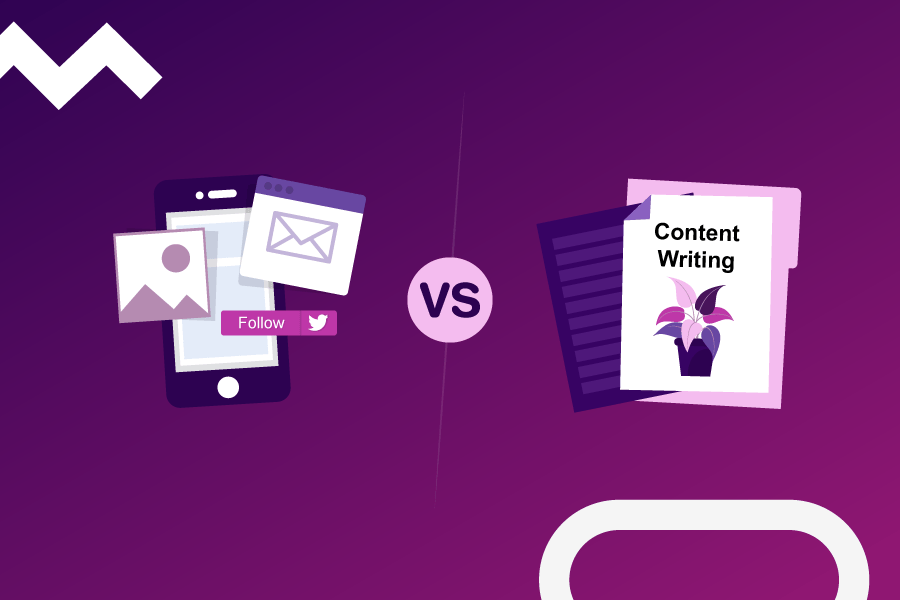Copywriting and content writing are both essential to any digital marketing strategy and serve a single purpose – helping you communicate with potential clients. They also work with the same tool – words.
However, copywriting and content writing is hardly the same. They differ in their intent and the tactics they employ to accomplish it.
While copywriting has the intention to persuade, content writing strives to inform and engage. Copywriting inspires immediate action, while content writing nurtures connections in the long run to prime an audience for future conversion.
What Is Copywriting?
The best way to help us define exactly what copywriting is, is by looking at some examples. All of the following are considered copywriting:
- CTA Buttons
- Pop-ups
- Headlines
- Ads
- Landing Pages
- Promotional materials
So what do all of these have in common? For one, they are all created entirely for marketing purposes. Copy doesn’t seek to inform, entertain, or educate. Instead, it is focused on one thing and one thing only – to convince. Copywriters mean to persuade people to take action, whether it be to subscribe to an email list or purchase a product, after interacting with their copy.
Ultimately, the copy must close the bridge between an advertised product or service and the experience or benefit it will provide the reader.
Copywriting is often short, easy to read, uses common language, and evokes an emotional response from the reader. In most cases, it is also witty, funny, relatable, eye-catching, or engaging in some other way.
Unlike content writers creating thousand-word long blog posts, copywriters don’t have the luxury of words. They have to convince their audience to act in just a few words or sentences. Hence why being able to leverage the readers’ emotions, speak in the target audience’s language and good sense of creativity are essential for any successful copywriter.
“I don’t know the rules of grammar. If you’re trying to persuade people to do something, or buy something, it seems to me you should use their language.”
— David Ogilvy
Content, Copy, and SEO
While every writer on your digital marketing team should be well versed in SEO, it is your content writers who must absolutely master the art of search engine optimization.
Why?
Nowadays, we depend on search engines to find just about everything. In some cases, we can use search engines to find a product or service we are already thinking about acquiring. Hence why copy-writers should be able to optimize their landing pages and web copy around certain “keywords”, making it easy for their potential customers to find their business.
However, more often than not, people go to Google and other search engines to find solutions, answers, and information without a specific product or service in mind. In other words: they are looking for content.
The better your content writer is at SEO, the more visible your content will be and the more traffic your website will have. In turn, you can leverage a growing stream of readers to subtly and efficiently promote your content and services.
While your products have only one (or maybe a couple) landing pages, you can publish as much content (articles, guest posts, newsletters, etc.) as you like, each giving you a possibility to boost visibility, increase traffic, promote your business and of course, build a relationship with your target audience.
Copywriting vs Content Writing

Which Is Better: Copywriting vs Content Writing?
Copywriting vs content writing, who’s the winner? Let us cut to the chase: neither. If you want to succeed, you simply can’t afford to choose one over the other.
Anything and everything you add to your website gives you an opportunity to make an impression on your potential client. This applies to your web design, user experience, media, and obviously, your content. Each type of writing, copy, and content, has its time and place in any successful digital marketing strategy.
In a way copywriting and content writing are made to work together.
Picture this: a curious internet user is looking for a solution related to your area of expertise. Using a search engine, they stumble across your blog post, finding great information to help them along their journey.
After reading a couple of your posts, they get to trust you know what you’re talking about and have the means to help them. Already on your site, they’re one click away from your products and services. There’s where copywriting comes in. After skimming over the butter-cream-smooth copy on your landing pages, they click on that magical purchase button. You just made a sale!
(Trust us this works! Our SEO marketing case study examines how our client was able to double traffic and triple sales through blogging and new web copy alone)
They say that in order to receive one must be willing to give. Content writing helps you prime your audience by providing solutions and answers. In return, you get your audience’s trust and loyalty. This is when copywriting is the most effective. All it has to do is give your potential customer the final push in the right direction.
There are also some cases in which copywriting and content writing play a role in a single web content piece or work together. For example
- Case studies and articles containing calls to action (which are little snippets of copy)
- Landing pages featuring sections featuring resources, FAQs, or other kinds of purely informational content
- Pop-ups with catchy copywriting that get a visitor to subscribe to an email list, getting a content-filled ebook in return
- Using copywriting techniques for article headlines
- An email newsletter with ads and educational content.
Content and Copywriting That Stands Out
There is only one way to get outstanding content and copy for your site: either by learning to produce it yourself or by hiring professional content writing services. Running a successful business is challenging on its own, without trying about to become a writer on a time crunch. However, if you do decide to go for it on your own, you’ll find many resources online to help you along the way. If you already feel confident in either of the two, you can also opt for getting help with the type of writing you struggle with the most.
Nonetheless, we honestly do recommend hiring a professional to handle your content marketing strategy if you want to see clear-cut results from your marketing efforts and be able to focus your resources on business development. Especially if you are trying to stand out in a competitive or saturated niche.
Conclusion
Copywriting vs content writing is one of the most common questions clients have when discussing their content marketing strategy. Each type of writing plays its own role in digital marketing, however, both contribute to your business’s growth. Mastering and leveraging both content and copy on your website will help you connect with your audience, share your knowledge, and convert sales all at the same time.
